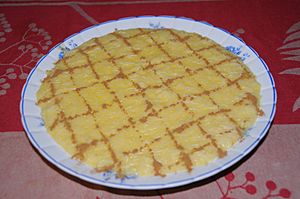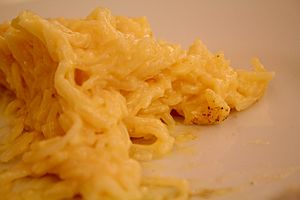Aletria facts for kids
Aletria is a special dessert from Portugal. It's a bit like a creamy pudding or custard. This sweet treat is made with very thin pasta, called vermicelli. In Portugal, this pasta is also known as aletria.
This dessert can be different depending on where you are in Portugal. In the Beiras region, aletria is quite firm. You can even cut it into slices! But if you go to the Minho region, you'll find aletria is much creamier.
The Story of Aletria
Where Did Aletria Come From?
Aletria has a long history! People believe that vermicelli pasta first came to the Iberian Peninsula (where Portugal and Spain are) a very long time ago. This was around the 8th or 9th century. It was brought by the Moors, who were people from North Africa.
This thin pasta stayed popular in Portugal. It became a key ingredient in Portuguese cooking. Over time, it started to be used for a special sweet dish. This dish is now a traditional Christmas candy. You can find it in almost all parts of Portugal during the holidays.
A Name That Stayed
The name aletria itself is interesting. While the pasta is still used in Spain, the name aletria mostly disappeared there. It only remained in a small area, the ancient Kingdom of Murcia. But in Portugal, the name stuck!
It's also worth noting that Catalan cuisine (from a region in Spain) got many new foods from the Arabs. Vermicelli was one of these important foods. This shows how different cultures can share and adapt food traditions.
 | George Robert Carruthers |
 | Patricia Bath |
 | Jan Ernst Matzeliger |
 | Alexander Miles |



